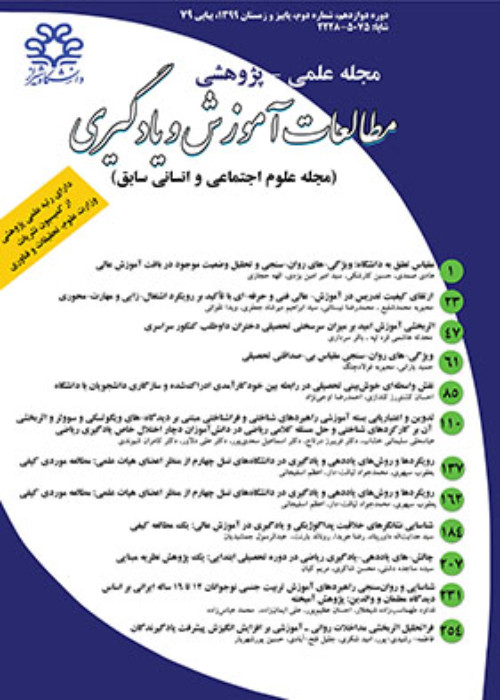Meta-Analysis of the Relationship of Emotional Intelligence and Its Components with Self-Efficacy
Self-efficacy, discussed in the field of positive psychology, is one of the most important components in success and compromise. It originated from Albert Bandura's cognitive-social theory. According to this theory, humans are active organisms that can regulate their behavior and can control events by their behavior (Bandura, 2000). Bandura defines self-efficacy as the individual's assessment of their ability to complete a set of acts for achieving goals (Zajakova and Lynch, 2005). Emotional intelligence is one of the most important emotional factors in individuals that can be important in their self-efficacy perception. The term was first introduced by Salovey and Mayer in 1997, and refers to a form of social intelligence that focuses on the individual’s ability to control their own and others’ emotions, and to distinguish between the two and to use this information to guide their thought and actions (Salovey and Mayer, 2002). Emotional intelligence involves at least five main skills which include self-awareness, self-control, self-motivation, social consciousness, and social skills. There is a lot of research about the interrelationship between self-efficacy and emotional intelligence on individual and social success in lifespan. For example, emotional intelligence has been shown to result in self-excitability, stability in failure situations, impulses control, the ability to work with insistence and hope (Nouri Samarin, 1395). Recently, a lot of research has been conducted on the relationship between the various components of emotional intelligence and self-efficacy. The results, however, have not been consistant. Given the expansion of research on the relationship between emotional intelligence and self-efficacy, it is necessary to summarize their results to solve the contradictions in the findings and to reach the overall conclusion about this relationship. One of the precise methods of aggregating the quantitative results is the meta-analysis method. Considering the theoretical and empirical bases, the purpose of this research is to perform a meta-analysis of the research on the relationship between emotional intelligence and its five components and the individual’s self-efficacy.
The present study conducted a Meta analysis of the previous studies on the relationship between emotional intelligence and self-efficacy. This involved converting the quantitative results of the previous studies on the issue into a common scale and then re-analyzing the quantitative data from these studies with specific statistical methods. The most common method for combining numerical results is the effect size, which shows the results of each research and the relationship value between two variables as a standard score (z). The effect size is an indicator of the intensity of the effect, the intervention, or the difference between groups. In general, there are two major effect size families: the group r and group d. The r group effect sizes are used in correlational research and the d group effect sizes are used when the researcher examines the differences. Bearing in mind that the present study conducted a Meta analysis of the correlational researcch on self efficacy and emotional intelligence, the r-group and Pearson correlation coefficient was used as a measure of the effect size.
The results of the stuy showed that emotional intelligence and its components had a significant effect on the individual's self-efficacy and based on cohen's criterion, the effect size of this relationship was found to be moderate (ES=0/34). In the study of the impact of the moderating variables on emotional intelligence components, the primary research population, and the primary research sample size showed a significant relationship between the independent and dependent variables. In summary, based on this metaanalysis results, it can be concluded that emotional intelligence training can have a significant effect on people's self-efficacy.
This meta-analysis was conducted with the aim of combining the studies done on the relationship of emotional intelligence and its components with self-efficacy in Iran. Based on the criteria for the inclusion or exclusion of the studies in the analysis, 22 were selected. Of these studies, 54 effects were obtained and after sensitivity analysis, 50 effect sizes remained in the analysis. Based on the random-effects model, the overall effect size for the stated relationship was (E=0.34), which is moderate according to Cohen's criterion. This implies that people with high emotional intelligence have more effective power in dealing with stressful events because they can understand, assess, and control their emotions more precisely and they can develop their mood to manage more efficiently and to prevent self-efficacy in difficult circumstances. Hence, the finding highlights the importance of educating the individuals to be emotionally intelligent so as to enhance their self-efficacy. Moreover, according to Cohen (1977), the sum of the effect sizes of the relationship between the components of emotional intelligence (except for self-motivation) and self-efficacy was found to be moderate. This indicates that emotional intelligence and its components, except of self-motivation, can predict self-efficacy, thus highlighting the need to train individuals to be emotionally intelligent so as to promote their self-efficacy. Nevertheless, the sum of self-motivation effect sizes was significant and very low (0.08). The reason may be that even though self-motivation can, through individual perseverance, lead to success and can strengthen self-efficacy, the idealism and insistence on things beyond the power of individuals leads to failure and ultimately undermines their self-efficacy. According to the results of this meta-analysis, emotional intelligence training could positively and meaningfully promote the self-efficacy of all social groups; therefore, it is suggested that the educational programs put into action the existing packages on emotional intelligence.
- حق عضویت دریافتی صرف حمایت از نشریات عضو و نگهداری، تکمیل و توسعه مگیران میشود.
- پرداخت حق اشتراک و دانلود مقالات اجازه بازنشر آن در سایر رسانههای چاپی و دیجیتال را به کاربر نمیدهد.


